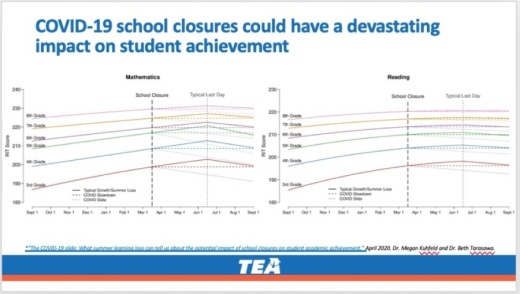According to a the agency's website, the TEA anticipates short-term disruptions to instruction and an increase in student absenteeism, with some students consistently absent due to COVID-19.
To minimize disruptions, the TEA has created school calendar scenarios that can adjust for learning loss. Projections show the possibility of a year’s worth of progress lost in math for students.

Calendar revisions will require substantial changes at the district level, including school board approval.
Scenario 1: An intersessional calendar
An intersessional calendar would include longer breaks throughout the school year that provide flexibility.

Changes with an intersessional calendar would include:
- an earlier start date
- longer breaks
- a later end date
- built-in remote learning time
- staggered in-person attendance
- six weeks of intersessional breaks in addition to the regular calendar for remediation, acceleration or enrichment; breaks required due to resurgence of COVID-19; or bad weather makeup days
House Bill 3, a school finance bill passed in 2019 during Texas’ 86th legislative session, allows districts the option of implementing an extended school year in elementary schools.
The open for additional days in the school year would allow for up to 30 additional school days, in addition to the minimum required 180 instructional days.
Calendar redesign options with additional days include:
- optional summer learning;
- an intersessional calendar with intermittent breaks for targeted remediation with a subset of students; and
- a full year redesign with a revamped calendar of seven six-week sessions, daily schedule changes to increase teacher planning time and student play.
Some school boards, such as Fort Bend ISD in the southwest Houston area and Richardson ISD in the northeast Dallas area, have already approved offering online options for students beginning at the start of the 2020-21 school year.
To learn more about these options and next steps from the TEA, visit tea.texas.gov.





